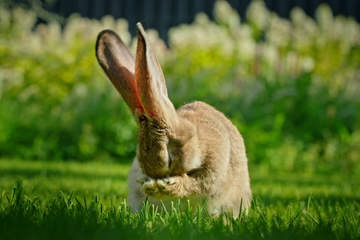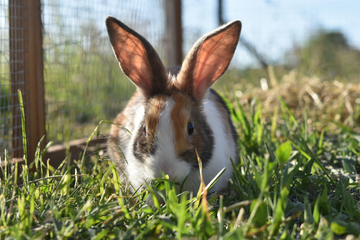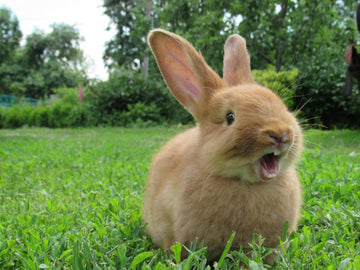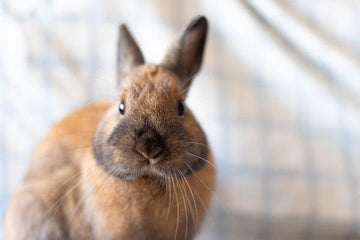Why Does My Small Pet Eat Its Own Poop?
If you are a new owner of a rabbit, guinea pig, chinchilla, or other small pet, one thing you may question is why your adorable pet is eating its own poop. After all, dog owners grimace when their canine companions eat their own excrement or raid the cat box for a late-night snack. Most people cringe just thinking about poop-eating pets.
Click Here For a Beginners Guide to Rabbit Care.

So, is this something you should discourage your small pet from doing? As a responsible owner, you realize that your small pet’s gastrointestinal system is sensitive.
If you are a new owner of a rabbit, guinea pig, chinchilla, or other small pet, one thing you may question is why your adorable pet is eating its own poop. After all, dog owners grimace when their canine companions eat their own excrement or raid the cat box for a late-night snack. Most people cringe just thinking about poop-eating pets.
Poop-Eating Is Normal for Rabbits and Small Animals
You must keep in mind that this is the animal kingdom. While the thought of coprophagia — the technical term for the consumption of feces — fills most humans with stomach-churning revulsion, a rabbit's own feces is actually an important component of a healthy small animal's diet.
But healthy rabbits, guinea pigs, chinchillas, and other small pets don't eat the harder, pellet-like poop that you see when you clean their litter boxes, hutches, or living quarters. In fact, it's pretty rare for the average small pet owner to catch a glimpse of their pets eating their poop.
They Most Often Excrete This Poop at Night
Your rabbit's, guinea pig’s, and chinchilla’s soft poop is so integral to a healthy diet that it is given a special name — cecotropes. This poop is quite different in appearance, form, and content from their usual hard pellets. The much softer cecotropes are packed with life-sustaining nutrients like amino acids and vitamins. They eat their own poop because your small pet did not properly absorb the nutrients the first time when they passed through the digestive system.
But have no worries. That doesn't mean that your small animal is sick. Quite the opposite, as failing to eat their cecotropes could mean that your pet's digestive system is off-kilter.
How It All Works
Have you ever seen a cow chew its cud? Plugs of grass or hay are regurgitated back into the animals' mouths for further chewing. This is somewhat comparable to the process when rabbits, guinea pigs, or chinchillas gobble down cecotropes.
After your small pet eats, the food makes its way through their digestive system. When it reaches the colon, digestive muscles push it back into the cecum. There, the bacteria ferments the semi-digested meal and turns it into the simple sugars your rabbit then re-ingests as they get excreted from the rectum.
How Do You Know If Your Rabbit Is Eating Its Cecotropes?
You may never see your furry friend eat their cecotropes because the production and re-ingestion of cecotropes take place either very late at night or early in the morning. You might have glimpsed this activity before without ever realizing just what you witnessed. That's because many small animals eat their cecotropes as quickly as they come out of their rectums.
But if you are up late one night or arise early in the morning, go check on your small pet and see what they’re doing. If you see them licking their bottom, that's a good sign as they are eating their cecotropes. Because small animals like rabbits, guinea pigs, and chinchillas are quite particular, there is rarely evidence of sticky cecotropes left behind on the anus or the surrounding fur. If you suddenly spot sticky, gooey poop around your rabbit's bottom, it could be a sign that a vet trip is in order.
Is There Anything That You Should Be Doing to Encourage Your Pet to Eat Its Poop?
Nope! You want to keep your beloved bun happy and healthy. But normally, you will not need to do anything besides continue to feed them a healthy diet of farm-fresh hay. It can't be stressed enough how important it is to provide your small pet with an all-day supply of high-quality Timothy Hay and fresh Orchard or Mountain Grass.
Unlike dogs and cats, which are usually fed once or twice a day by their owners, bunnies, guinea pigs, chinchillas, and many other small animals freely graze all day and night. Not having sufficient fibrous grasses in a rabbit's, guinea pig’s, or chinchilla’s diet can affect both their digestive and dental health.
Be Proactive About a Healthy Small Animal Diet
A continuous supply of fresh, green hay without any signs of mold growth will keep your bunny producing the necessary cecotropes it needs to remain healthy. The roughage also acts like a fine sandpaper to ensure your rabbit's teeth — which continually grow throughout its lifetime — will not get too big for their tiny mouths.
You can arrange for scheduled deliveries of to be shipped right to your door to ensure the supply chain of bunny food remains uninterrupted. With proper care and feeding, your pet will remain healthy and live out its best life

"Why Is My Rabbit Licking Her Own Pee?"

Rabbit Is It Low Maintenance or More Work Than You Think?

Tips to Manage Rabbit Chewing Habits







